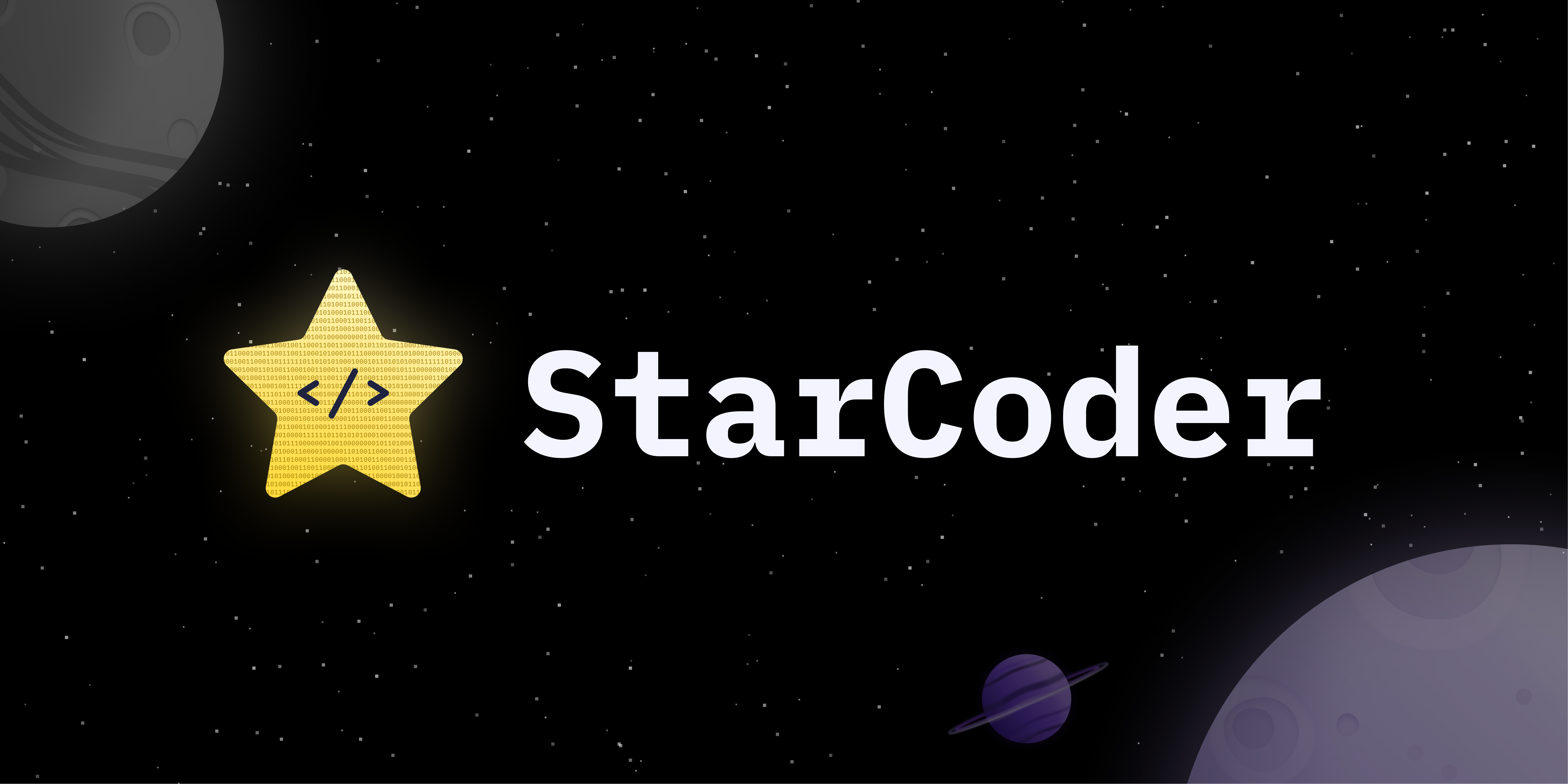# Fast-Inference with Ctranslate2
Speedup inference while reducing memory by 2x-4x using int8 inference in C++ on CPU or GPU.
quantized version of bigcode/starcoder
pip install hf-hub-ctranslate2>=2.12.0 ctranslate2>=3.16.0
# from transformers import AutoTokenizer
model_name = "michaelfeil/ct2fast-starcoder"
from hf_hub_ctranslate2 import GeneratorCT2fromHfHub
model = GeneratorCT2fromHfHub(
# load in int8 on CUDA
model_name_or_path=model_name,
device="cuda",
compute_type="int8_float16",
# tokenizer=AutoTokenizer.from_pretrained("{ORG}/{NAME}")
)
outputs = model.generate(
text=["def fibonnaci(", "User: How are you doing? Bot:"],
max_length=64,
include_prompt_in_result=False
)
print(outputs)
Checkpoint compatible to ctranslate2>=3.16.0 and hf-hub-ctranslate2>=2.12.0
compute_type=int8_float16fordevice="cuda"compute_type=int8fordevice="cpu"
Converted on 2023-06-27 using
ct2-transformers-converter --model bigcode/starcoder --output_dir ~/tmp-ct2fast-starcoder --force --copy_files merges.txt tokenizer.json README.md tokenizer_config.json vocab.json generation_config.json special_tokens_map.json .gitattributes --quantization int8_float16 --trust_remote_code
Licence and other remarks:
This is just a quantized version. Licence conditions are intended to be idential to original huggingface repo.
Original description
StarCoder
Play with the model on the StarCoder Playground.
Table of Contents
Model Summary
The StarCoder models are 15.5B parameter models trained on 80+ programming languages from The Stack (v1.2), with opt-out requests excluded. The model uses Multi Query Attention, a context window of 8192 tokens, and was trained using the Fill-in-the-Middle objective on 1 trillion tokens.
- Repository: bigcode/Megatron-LM
- Project Website: bigcode-project.org
- Paper: 💫StarCoder: May the source be with you!
- Point of Contact: contact@bigcode-project.org
- Languages: 80+ Programming languages
Use
Intended use
The model was trained on GitHub code. As such it is not an instruction model and commands like "Write a function that computes the square root." do not work well. However, by using the Tech Assistant prompt you can turn it into a capable technical assistant.
Feel free to share your generations in the Community tab!
Generation
# pip install -q transformers
from transformers import AutoModelForCausalLM, AutoTokenizer
checkpoint = "bigcode/starcoder"
device = "cuda" # for GPU usage or "cpu" for CPU usage
tokenizer = AutoTokenizer.from_pretrained(checkpoint)
model = AutoModelForCausalLM.from_pretrained(checkpoint).to(device)
inputs = tokenizer.encode("def print_hello_world():", return_tensors="pt").to(device)
outputs = model.generate(inputs)
print(tokenizer.decode(outputs[0]))
Fill-in-the-middle
Fill-in-the-middle uses special tokens to identify the prefix/middle/suffix part of the input and output:
input_text = "<fim_prefix>def print_hello_world():\n <fim_suffix>\n print('Hello world!')<fim_middle>"
inputs = tokenizer.encode(input_text, return_tensors="pt").to(device)
outputs = model.generate(inputs)
print(tokenizer.decode(outputs[0]))
Attribution & Other Requirements
The pretraining dataset of the model was filtered for permissive licenses only. Nevertheless, the model can generate source code verbatim from the dataset. The code's license might require attribution and/or other specific requirements that must be respected. We provide a search index that let's you search through the pretraining data to identify where generated code came from and apply the proper attribution to your code.
Limitations
The model has been trained on source code from 80+ programming languages. The predominant natural language in source code is English although other languages are also present. As such the model is capable of generating code snippets provided some context but the generated code is not guaranteed to work as intended. It can be inefficient, contain bugs or exploits. See the paper for an in-depth discussion of the model limitations.
Training
Model
- Architecture: GPT-2 model with multi-query attention and Fill-in-the-Middle objective
- Pretraining steps: 250k
- Pretraining tokens: 1 trillion
- Precision: bfloat16
Hardware
- GPUs: 512 Tesla A100
- Training time: 24 days
Software
- Orchestration: Megatron-LM
- Neural networks: PyTorch
- BP16 if applicable: apex
License
The model is licensed under the BigCode OpenRAIL-M v1 license agreement. You can find the full agreement here.
Citation
@article{li2023starcoder,
title={StarCoder: may the source be with you!},
author={Raymond Li and Loubna Ben Allal and Yangtian Zi and Niklas Muennighoff and Denis Kocetkov and Chenghao Mou and Marc Marone and Christopher Akiki and Jia Li and Jenny Chim and Qian Liu and Evgenii Zheltonozhskii and Terry Yue Zhuo and Thomas Wang and Olivier Dehaene and Mishig Davaadorj and Joel Lamy-Poirier and João Monteiro and Oleh Shliazhko and Nicolas Gontier and Nicholas Meade and Armel Zebaze and Ming-Ho Yee and Logesh Kumar Umapathi and Jian Zhu and Benjamin Lipkin and Muhtasham Oblokulov and Zhiruo Wang and Rudra Murthy and Jason Stillerman and Siva Sankalp Patel and Dmitry Abulkhanov and Marco Zocca and Manan Dey and Zhihan Zhang and Nour Fahmy and Urvashi Bhattacharyya and Wenhao Yu and Swayam Singh and Sasha Luccioni and Paulo Villegas and Maxim Kunakov and Fedor Zhdanov and Manuel Romero and Tony Lee and Nadav Timor and Jennifer Ding and Claire Schlesinger and Hailey Schoelkopf and Jan Ebert and Tri Dao and Mayank Mishra and Alex Gu and Jennifer Robinson and Carolyn Jane Anderson and Brendan Dolan-Gavitt and Danish Contractor and Siva Reddy and Daniel Fried and Dzmitry Bahdanau and Yacine Jernite and Carlos Muñoz Ferrandis and Sean Hughes and Thomas Wolf and Arjun Guha and Leandro von Werra and Harm de Vries},
year={2023},
eprint={2305.06161},
archivePrefix={arXiv},
primaryClass={cs.CL}
}
- Downloads last month
- 8
Dataset used to train michaelfeil/ct2fast-starcoder
Evaluation results
- pass@1 on HumanEval (Prompted)self-reported0.408
- pass@1 on HumanEvalself-reported0.336
- pass@1 on MBPPself-reported0.527
- pass@1 on DS-1000 (Overall Completion)self-reported0.260
- pass@1 on MultiPL-HumanEval (C++)self-reported0.316
- pass@1 on MultiPL-HumanEval (C#)self-reported0.210
- pass@1 on MultiPL-HumanEval (D)self-reported0.136
- pass@1 on MultiPL-HumanEval (Go)self-reported0.176
- pass@1 on MultiPL-HumanEval (Java)self-reported0.302
- pass@1 on MultiPL-HumanEval (Julia)self-reported0.230
